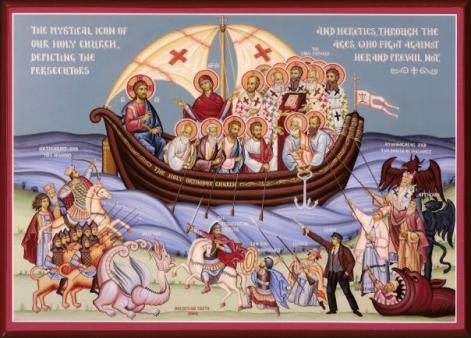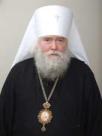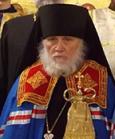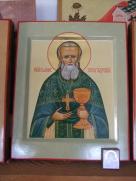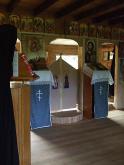Thursday, August 13, 2015
Abbess Alexandra: About two Church Issues (conference report). Part 2
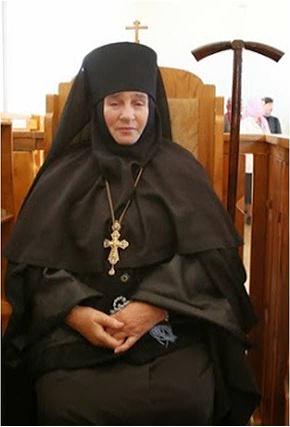 Part 2 of 2
Part 2 of 2
The second question concerns the proper concept of catholicity of the Church. I have met many worthy people among the first and second waves of Russian emigrants in America. However, in recent years there is a disturbing tendency present in our Russian Orthodox Church Abroad parishes. The parishioners think that the priest is simply a hired servant. They say: “We decide what to do - the priest is just supposed to serve”. Vladika Averky called this kind of parish “presbyterian”, because each parishioner is an “elder” [Tr. note: a presbyter] in spirit. A “presbyterian parish” holds the rights of the bishop, priest and layman equal. Accordingly, it believes that the parish can challenge the decisions of a Sobor or Synod. Unfortunately, this “presbyterian spirit” has gradually spread to all the parishes in America. During my last visit I had to avoid contact with my former close acquaintances, because it would be useless to argue. They are spreading presbyterianism to all areas of church life. All this stems from an incorrect understanding of the principle of conciliarity [Tr. note: sobornost] of the Church.
If we are Orthodox, we must abide by the decisions of the Council of Bishops and the Synod of our Church. It is not in our competence to challenge these decisions. If we do so, it means we are foolhardy enough to stand outside of the Church, outside of Orthodoxy.
Every bishop has his own character, his human qualities, and some shortcomings. It is possible for us to disagree a little with some of the bishops, perhaps even be disgruntled, but we should keep this to ourselves. We must not raise a rebellion within the Church due to personal ambitions. By doing so, we are destroying the Church, since, according to the canons, neither the laity, nor the priests steer the ship of the Church. This right is given to the bishops, who have received the grace of Christ through apostolic succession. The special cases in which it is necessary to express disagreement with the decisions of the Bishop (or Synod) are, as we know, defined by the canons.
Without the blessing of the Bishop, a priest has no right to serve. The bishop gives him an antimins, on which he can perform the service. In cases of necessity, the Bishop may confiscate the antimins. Then the priest can not serve; not to mention, to govern the Church. As much as all of us (priests, monastics and laity) would like to participate in solving church questions, we have no right to do so.
In Apostle Paul’s first letter to the Corinthians, by the Apostle Paul, we read:
“For as the body is one, and hath many members, and all the members of that one body, being many, are one body: So also is Christ.”
(1 Cor. 12:12).
In his sermons on this text, St. John Chrysostom writes:
For as the body and the head are one man, so he said that the Church and Christ are one. Wherefore also he placed Christ instead of the Church, giving that name to His body. “As then,” saith he, “our body is one thing though it be composed of many: so also in the Church we all are one thing. For though the Church be composed of many members, yet these many form one body.
[4]
Here I would like to offer a metaphor, and unfortunately I must resort to medical terminology. All the members of the Church are one body, and each member of the Church can be compared to an individual cell. It is obvious to anyone that a single call cannot control the organism. In the human body, in addition to the many useful cells, there is always a certain amount of unstable cells, which may form a tumour, which in turn can take over the entire body. Even if the tumor is removed, it can still happen that some of these cancer cells migrate through the lymphatic system and can cause a relapse destroying the body. Everyone knows that cancer cells need to be removed from the body for it to function normally.
Perhaps it is sinful and inappropriate to compare cancer cells with people who instigate rebellion within the Church. But in reality we unfortunately face a problem in the church when some priests assert that we have no conciliarity. In their opinion, conciliarity is disturbed by the fact that the ruling Bishop requires obedience of them. He demands that they be involved in their parishes, rather than travel about constantly from place to place as they want (to the Holy Land, Mount Athos, or other countries). They have spiritual children scattered around the world. However, in matters of spiritual guidance you need consistency, and a permanent, real-life contact with the flock, which is exactly what the ruling bishop requires of his priests. Otherwise the priests are playing at “being an elder”.
Among priests, there are also some who are engaged in politics. This is not at all a church-centred occupation. And if the bishop seeks to limit this kind of self-willed activity of priests in his diocese, they are ready to organise a rebellion in the Church. For these pastors conciliarity is the same as democracy. They would like to have a role in governing the Church. However, the canons establish that the Church is ruled by the bishops, the Synod and the Councils.
A proper understanding of catholicity of the Church is founded on the common effort of all the members of the Church (bishops, priesthood, monastics and laity) to preserve the Body of Christ in the spirit of love and harmony. Priests and lay people must communicate to the bishop (or if necessary even to the Synod) any problems or disputes, so that the Synod may make appropriate decisions. In no circumstances are the people of the church permitted to destroy the Body of Christ by divisive actions based on discontent.
On the question of conciliarity of the Church, I refer to the opinion of Metropolitan Filaret:
“Many misunderstand the concept of “catholicity”, and demand that lay people take part in the governance of the church, along with the bishops and clergy. In this regard, I would like to tell you briefly what is a true Sobor (Council).
In the book of Acts of the Apostles we read that there was a very serious discussion on whether to accept the pagans to Christianity directly. In other words, should they be baptised at once, or should they first be required to fulfill the law of Moses? When talking about this, the issue became so serious that even the apostles would not solve it themselves. They therefore came together to discuss it. In the book of Acts of the Apostles it says that “the apostles and elders came together for the consideration of this matter” (Acts 15:6). Now, naturally, you might ask: The apostles and presbyters, but what about the bishops? In fact, at the time when the Apostles served, their subordinates - bishops and priests - did not in essence differ much as to their powers and duties. However, when the apostles went to their Master in the better world, their place was taken by the bishops. That is the point at which the degree of bishops was separated from the priesthood, as being superior. But at the time of the Apostles, both the bishops and priests were subordinates, the assistants of the Apostles. We see that it is so, for example, from the place in the book of the Acts of the Apostles, which reads: “For Paul …. sent to Ephesus, and called the elders of the church.” (Acts 20:17) A little further on in the text, he says that the Apostle addressed them and said: “Take heed therefore unto yourselves, and to all the flock, over the which the Holy Ghost hath made you overseers, to feed the church of God, which he hath purchased with his own blood.” (Acts 20:28) So, the very same people are referred to as both “bishops” [overseers] and “elders” [presbyters] in the Book of Acts.
Gathering in Council, the Apostles also called their subordinates to the discussion of this important issue. That is how the question was discussed. When the Council ended, the decision statement began: [b]“The apostles and elders and brethren send greeting unto the brethren…”[/b] (Acts15:23). The brethren - that is, of course, the laity. It is clearly indicated that the discussion of the matter and decisions were made only by the Apostles and their subordinates - the members of the clergy. The lay people were probably present, but did not have a voice in this context. Possibly they took part in the statements of their views. Nevertheless, they did not have what is called a “decisive” voice. The resolution of the Council was still sent on behalf of all the brethren.
The Apostolic Council was the prototype of the Ecumenical Councils. Since there were no more Apostles, the Councils were headed by bishops. Members of the clergy were also present, and at some of the Ecumenical Councils there were even laymen. It is quite different with the Councils of Bishops, which meet not as rarely as Ecumenical Councils, and which do not make decisions on extraordinary questions, but rather gather regularly and continuously. The basic rule regarding the Council of Bishops states: The Council of Bishops should meet twice yearly, in order to discuss with each other any difficulties of questions encountered. There is not even a hint about laymen. On the contrary, the rule emphasizes that the bishops should only confer “with each other.” This is the way it always has been at Councils of Bishops.”
“Scripture says,” Every man a liar “, or in plain speech [Russian]: every man is a liar. This does not mean that we are all lying all the time - no! This means that no one person, no matter how wise, or holy if you like, or experienced, etc, can claim infallibility and rely on his own opinions. The higher the issues and questions, the more dangerous the mistakes. In matters of religion, the church, and moral teaching, no one can rely solely on himself. The Church has left us canons, laws and regulations as the basis upon which normal church life is built. No matter what ugliness in life will make its appearance, and no matter what difficulties we will have to face, we must keep this framework inviolate! This is why a bishop of the Orthodox Church proclaims his confession of faith, his episcopal promise, immediately before his consecration. It is a statement that he personally commits to being the custodian of all the conciliar rules and canons of the Holy Apostolic Church. He promises to be a guardian of them, even at threat of death.”
“The canons and rules of the Church are the spiritual foundation upon which spiritual life rests. No one can abandon this foundation without immediately running into mistakes and errors. Once St. Seraphim of Sarov said to one of the Old Believers, who came to him and tried to develop his thoughts (the Elder, as always, told him with love, but at the same time powerfully and strictly): “Leave your nonsense! The ship of Christ’s Church is sailing on the waves of the sea of life, and they cast Her about. She makes the voyage with great difficulty, yet you want to sail the ocean in the little boat of your own wise thoughts - this is madness!”. [5]
Abbess Alexandra
[4] St. John Chrysostom. Collected Works. Homily XXX on Corinthians.
[5] St. Filaret Voznesensky. Sermon “Catholicity and sobornost.”
Monday, August 10, 2015
Abbess Alexandra: About two Church Issues (conference report). Part 1
 Part 1 of 2
Part 1 of 2
Today I would like to raise some questions concerning the life of the Church. It may seem strange that I say this: These are simple truisms. However, these topics are some that constantly worry us (i.e. members of the Orthodox Church, the sisters of our monastery, and myself). Therefore I cannot avoid speaking about this. The first question concerns Holy Communion.
It happens that people come to our monastery from the Kiev or Moscow Patriarchate. What do we do if they wish to partake of the Holy Mysteries? We know that in Russia, there are very few parishes of the Church Abroad. Many of our relatives and friends go to the Moscow Patriarchate, because they have nowhere else to go. They understand where the truth is, but are unable to go to any parish of the Church Abroad.
There is another type of people who go to the Moscow Patriarchate, and do not particularly think about any differences we might have with it. For them, the Church is simply a tribute to tradition. This problem is not new. Already in 1979, Metropolitan Filaret stated well about a similar situation:
“What does it mean that many of the “orthodox” are indifferent to which Church they attend? It means simply that the truth is not dear to people. That is why they do not particularly think about these things. “They serve in the same way, everything is the same - why complicate matters unnecessarily?” Or, as father archpriest John Storozhev in Harbin (the last spiritual father of the Royal Family), one of the best pastors in the diaspora, used to say with bitter irony: “The bells ring, the priests serve, they sing well - what else do we need?”. And then they add that familiar cliche: “After all, God is one!” … ” [1]
In a letter to an Abbess of one of our monasteries abroad which is visited by people of different jurisdictions, Metropolitan Filaret offers his solution:
“It seems clear to me that there can only be correct “missionary work” in the monastery when such visitors are allowed into the Church; however, admitted to the Mysteries with one condition: If they partake of the Mysteries here, they must abandon “the Mysteries” of the Churches of other jurisdictions.Otherwise - what will happen?! It will seem to them that everything is in order in those churches, and that they do not need to change or correct anything. By allowing them to receive the Mysteries without requiring unity and consistency in this regard, we would be confirming even more that they are completely correct, and that their way is a true and correct way. ” [2]
Vladyka Filaret’s stand is the position of our Church - there is no doubt about this. However, in practice it often happens that priests act differently. Whether we like it or not, in such cases human attachments play a role. For example, relatives or friends of the priest may come from the MP, and it is difficult to deny them the Mysteries. Sometimes people who are far from the Church come, while finding themselves in a difficult situation in life. There is a desire to help, rather than push a person away. For such a person, the differences between the Russian Orthodox Church Abroad and the MP recede, not only to the secondary, but even the tenth level in comparison with the experiences of his broken life. Such a man has no desire to delve into religious matters. Therefore, the question of receiving Communion or not is approached on an individual basis, depending on the priest and the circumstances. Maybe some of you in the audience can share your experiences in addressing such situations.
Today, the situation is further complicated for the faithful, in that the Church is used for political purposes. Here is one example:
“On February 12th, during the truce between the government and the opposition organization “Ukrainian National Council” (chairman Igor Druz), an initiative in support of the “MVD Berkut” special forces was carried out. This division is protecting the government quarter from Grushevsky Street from the protesters at the Euromaidan. Representatives of “political orthodoxy” brought Archpriest Alexei Yefimov, rector of the Church of Saint Anthony and Theodosius of Kiev (of the Vasilkov diocese of the Ukrainian Orthodox Church (Moscow Patriarchate), in order to serve a moleben service, and commune the Special Forces soldiers with the Blessed Sacrament (of the the body and blood of Christ).” [3 ]
At present, there is a war in the Ukraine. Among the soldiers there are also priests who serve services, and, if necessary - baptise, administer communion, and bury those who have died. Again the question arises: To whom can the priest administer the Mysteries (perhaps in conditions of mortal danger)? Indeed, among those who are fighting there are members of our Church, as well as Greek Catholics, people of the Ukrainian Patriarchate, people from the Moscow Patriarchate, and people far from the Church. How do we avoid breaking the commandment of love in such a situation?
All the Holy Mysteries (and especially so, Holy Communion) - are a matter of conscience for each Orthodox person. This is when we speak of lay people who go to various churches, while not making any effort to sort out where the truth is. Yet, even among monastics there are some who, change their jurisdiction under the influence of external circumstances. They do this while knowing full well where the truth is. I do not want to condemn anybody: this is a matter of each person’s conscience..
In the Holy Land, I came across old nuns who have lived for a long time in the monasteries abroad. After these monasteries joined the Moscow Patriarchate, they came under its omophorion. They do not support this union, but for various reasons can not leave the monastery where they have lived for so long. To leave a monastery for an elderly person is not so simple. Old age and illnesses object. Also, if they attempt to move to another country for permanent residence they have difficulties obtaining the necessary documents. In such cases, elderly persons tend to lose any social benefits they might have held previously. Many do not have the heart to give up everything and live in a foreign country, leaving behind their native monastery and relatives. Therefore, many of the older nuns have made peace with the lies, they go to the service and partake of Holy Communion in the Moscow Patriarchate. As they told me, during the commemoration of Patriarch Kirill, they stop up their inner spiritual ears. They say: “We do not pray for the patriarch”. Nevertheless, we understand that receiving Holy Communion in the Moscow Patriarchate makes all the communicants united in spirit, whether they like it or not.
Some of the nuns, who have had no opportunity to leave after the union with the MP, continue to live in their monastery and attend the services, but do not commune in the Moscow Patriarchate. For Holy Communion they go to the Church Abroad, whenever the opportunity presents itself.
For a long time I thought that only the sacraments separated us from the Moscow Patriarchate. Therefore I assumed that it was permissible to pray in the churches of the MP, in the case when it is not possible to attend a service in a parish of the Church Abroad. I have been on pilgrimages to the holy places of Moscow, St. Petersburg and Kiev. In Moscow, for example, I greatly enjoyed visiting the Donskoy, Danilov, and Novo-Spassky monasteries, as well as the Trinity-Sergius Lavra. If I visited on Sundays or feast days I would go to these monasteries for services. Of course, I did not take communion, but simply prayed. However, there was an event that showed me my error.
At that time, our monastery moved to the Ukraine, and we had already built our new church. I needed to go to Kiev, to the Kiev-Pechersk Lavra in order to buy church vessels. I asked one of our priests to accompany me. We left on a Friday and were due to return Sunday evening. We stayed with friends. On Saturday, while we were getting ready to leave, I asked the father why he did not put on a Cross. I was intending to attend the service at the Lavra. Batiushka answered that he had all the necessary books with him, and was going to pray somewhere near the caves. “I do not want to impose my views on you - it is your business. But for me, praying together in a church of the Moscow Patriarchate is impossible. This is not my personal opinion - this is the position of our church, ” the priest explained to me. I was embarrassed and ashamed of my lack of understanding. We prayed on the banks of the Dnieper. On that wonderful evening, I realised my long-held misconception. Everything fell into place. I realised that we are not able to attend the services in a church of the Moscow Patriarchate or any other jurisdiction, because we can not engage with them in common prayer, for this is a mystery in front of God.
I remember an incident that occurred with one of our priests in America. He was a priest of Jewish origin. His name was Father Elias. In his old age, he had become very frail, and his Jewish relatives put him in a Jewish nursing home. Father Elias was starting to lose his memory and sometimes did not recognize his loved ones. Before Christmas one of our priests, father Peter, who knew this father Elias, decided to visit him and commune him with the Holy Mysteries. Father Elias was very happy for father Peter’s arrival, and they spoke together very nicely. “Now, father Elias, why don’t you confess, and I will give you the Holy Mysteries,” - said father Peter. On hearing this proposal, father Elias became alarmed and answered: “I am very glad that you came to see me, but I cannot receive Holy Communion. I am a priest of the Church Abroad, and I do not know which Church you are from.” “But you know me - I am father Peter, I am also of the Church Abroad,” father Peter tried to convince his companion. “Yes, I remember you, but I do not know which church you are from. I have to consult with Vladyka Filaret,” continued father Elias. By that time, Vladyka Filaret had died, and Vladyka Vitaly was Metropolitan. Nevertheless, father Elias went to the telephone and dialed a number, and then began to speak.
Father Peter, who witnessed this wonderful conversation, told me that he had goose bumps when he saw firsthand that father Elias received instructions and answers to his questions from Vladyka Filaret. Father Elias prayed for Vladyka Filaret as living, and to him the Bishop was still alive. This elderly priest, not putting any trust in himself, took the blessing of his abba, connecting with him in spirit and in truth. And how could his soul, so full of humility not receive a blessing to receive the Holy Mysteries? “It was a miracle!” exclaimed father Peter when recalling the incident. When father Elias ended the conversation, he hung up and said cheerfully: “Metropolitan Filaret blessed. Let’s begin the Mystery (of Communion).”
This unusual case illustrates what should be the correct attitude to the sacraments of confession and communion. In all matters of contention we need to ask the Bishop’s blessing.
Abbess Alexandra
Part 2 to follow
[1] St. Filaret Voznesensky. Letter to an Abbess. November 26 / December 9, 1979
[2] St. Filaret Voznesensky. Letter to an Abbess. November 26 / December 9, 1979
[3] Religion in Ukraine, of 02.13.2014
Sunday, July 19, 2015
HOLY ZEAL
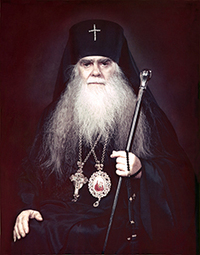 by Archbishop Averky (Taushev)
by Archbishop Averky (Taushev)
of Syracuse and Holy Trinity
“I am come to send fire on the earth. And what will I, but that it be already kindled?” Luke 12:49
The chief thing in Christianity, according to the clear teaching of the Word of God, is the fire of Divine zeal, zeal for God and His glory — the holy zeal which alone is able to inspire man in labors and struggles pleasing to God, and without which there is no authentic spiritual life and there is not and cannot be any true Christianity.
Without this Holy Zeal Christians are “Christians” in name only: they only “have a name that they live,” but in reality “they are dead,” as was said to the holy Seer of Mysteries John (Apoc. 3:1).
True spiritual zeal is expressed, first of all, in zeal for God’s glory, which is taught us in the words of the Lord’s Prayer which stand at its very beginning:
Hallowed be Thy Name. Thy Kingdom come, Thy will be done, on earth as it is in heaven.
Those who are zealous for God’s glory themselves glorify God with their whole heart — both in thought and feeling, both by words and deeds and with their whole life — and naturally desire that all other people should glorify God also in the same way, and therefore they cannot, of course, endure with indifference when in their presence, in some way or other, the name of God is blasphemed or holy things are mocked.
Being zealous for God, they sincerely strive to please God themselves and serve Him alone with all the power of their being, and they are ready to forget themselves all the way to sacrificing their very life in order to bring all men to the pleasing and the service of God. They cannot calmly listen to blasphemy, and therefore they cannot support communion with and have friendship with blasphemers and mockers of the Name of God and despisers of holy things.
A striking and extremely clear example of such fiery zeal for God’s glory comes to us from the depths of antiquity of the Old Testament in a great Prophet of God, the flaming Elias, who grieved in soul when he saw the apostasy from God of his people, led by the impious King Ahab, who introduced into Israel the pagan worship of Baal in place of the true God.“I have been very jealous for the Lord God Almighty — thus did he exclaim many times, expressing his grief — because the children of Israel have forsaken Thee: they have dug down Thine altars, and have slain Thy prophets with the sword, and I only am left, and they seek my life to take it” (3 Kings 19:10).
And behold, this Holy Zeal aroused him, by the power of the grace of God which reposed on him, as a chastisement of Israel which had apostatized from God, to “close heaven” (3 Kings 17:1; 18:42-45. James 5:17-18), so that there was neither rain nor dew for three years and six months.
This same zeal later aroused Elias to slay the false prophets and priests of Baal, after the miraculous descent of the fire from heaven on Mt. Carmel, so that these deceivers might no longer turn the sons of Israel away from the true worship of God (3 Kings 18:40).
By the power of the same Divine zeal, St. Elias brought down fire from heaven, which burned the captains and their fifties which had been sent by the king to size him (4 Kings 1:9-14).
That all this was in reality Holy Zeal which was pleasing to God is testified to by the fact that the Holy Prophet Elias did not die the usual death of all men, but was miraculously raised up to heaven in a chariot of fire, as if signifying his authentically fiery zeal for God (4 Kings 2:10-12).
But even then, in the severe Old Testament, the Lord Himself showed to His true servant that one can have recourse to such severe measures only in extreme cases, for the Lord was not
“in the great and strong wind rending the mountains and crushing the rocks, and not in the earthquake, and in the fire, but in the voice of a gentle breeze” (3 Kings 19:11-12).
This is why, when James and John, who were especially fervent in their zeal for the glory of their Divine Teacher, wished to bring down fire from heaven, imitating the Holy Prophet Elias, so as to punish the Samaritans who did not desire to receive Him when He was walking through the Samaritan village to Jerusalem, the Lord forbade them to do this, saying:
“Ye know not of what spirit ye are, for the Son of Man came not to destroy the souls of men, but to save” (Luke 9:51-56).
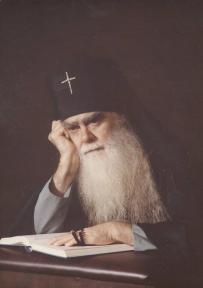 And nevertheless (let immoderate lovers of peace pay heed!), the Lord Jesus Christ Himself, Who said,
And nevertheless (let immoderate lovers of peace pay heed!), the Lord Jesus Christ Himself, Who said,
“Learn of Me, for I am meek and bumble of heart” (Matt. 11:29)
found it sometimes necessary to manifest great strictness and have recourse to severe measures, teaching us also by this very fact, that meekness and humility do not mean spinelessness and should not yield before manifest evil, and that a true Christian should be far from sugar-sweet sentimentality and should not step away in the face of evil which presumptuously raises its head, but should always be uncompromising towards evil, fighting with it by all measures and means available to him, in order decisively to cut off the spread and strengthening of evil among men.
Let us recall with what harsh accusatory words the Lord addressed the spiritual leaders of the Hebrew people, the scribes and Pharisees, condemning them for hypocrisy and lawlessness:
“Woe to you, scribes and Pharisees, hypocrites!”
and threatening them with God’s judgment (Matt. 23:29).
And when words turned out to be insufficient, He applied action against the lawless ones in very deed. Thus, finding that in the Temple they were selling oxen and sheep and doves, and money-changers were sitting,
“When He had made as it were a scourge of little cords, He drove them all out of the Temple, the sheep also and the oxen, and the money of the changers He poured out, and the tables He overthrew” (John 2:14-15; Matt. 21:12-13).
And we know many other examples from sacred and Church history when mere words of persuasion turned out to be insufficient and in order to cut off evil it was necessary to have recourse to more severe measures and decisive acts.
But it is essential that in such cases there should rally be in a person only pure and Holy Zeal for God’s glory, without any admixture of self-love or any other strivings of human passions which only hide themselves behind a supposedly Holy Zeal for God!
In the history of the Church, the great Hierarch of Christ Nicholas the Wonderworker, Archbishop of Myra in Lycia, whose memory we celebrate on December 6th according to our Orthodox calendar, has become glorious by just such an authentically Holy Zeal, with a decisive irreconcilability towards evil. Who does not know this wondrous Hierarch of Christ?
The most characteristic feature of St. Nicholas, which has given him such glory, is his extraordinary Christian mercy: the simple Russian people usually calls him “Nicholas the Merciful,” a title based on the facts of his life and the numberless cased of his help to men.
But once this great Hierarch, so glorious for his mercy toward his neighbor, performed an act which disturbed many and continues to disturb them even now, even though its authenticity is witnessed by the Church tradition contained in our iconography and Divine services.
According to tradition, St. Nicholas took part in the First Ecumenical Council in Nicaea, which brought forth a condemnation of the heretic Arius, who denied the Divinity of the Second Person of the Holy Trinity, the Son of God.
During the disputes which occurred in connection with this, St. Nicholas could not listen with indifference to the blasphemous speeches of the arrogant heretic Arius, possessed by pride, who demeaned the Divine dignity of the Son of God, and before the whole Council he struck him in the face with his hand.
This evoked such a general consternation that the Fathers of the Council decreed that the bold Hierarch be deprived of Hierarchal rank.
But in that very night they were made to understand by a wondrous vision: they saw how the Lord Jesus Christ gave St. Nicholas His Holy Gospel, and the Most Pure Mother of God placed upon his shoulders the episcopal omophorion. And then they understood that St. Nicholas was guided in his act not by any evil, passionately sinful motives, but solely by pure, Holy Zeal for God’s glory. And they forgave the Hierarch, abrogating their sentence against him.
By citing such a picturesque example, we do not in the least wish to say that every one of us can or should follow this example literally: for this one must be himself just as great a holy Hierarch as St. Nicholas.
But this should absolutely convince us that we do not dare to remain indifferent or be unconcerned about the manifestations of evil in the world, especially when the matter is one of God’s glory of our Holy Faith and Church. Here we must show ourselves to be completely uncompromising, and we do not dare enter into any sort of cunning compromises or any reconciliation, even purely outward, or into any kind whatever of agreement with evil. To our personal enemies, according to Christ’s commandment, we must forgive everything, but with the enemies of God we cannot have peace! Friendship with the enemies of God makes us ourselves the enemies of God: this is a betrayal and treason towards God, under whatever well-seeming pretexts it might be done, and here no kind of cunning or skillful self-justification can help us!
It is interesting to note how displeasing this act of St. Nicholas is to all the contemporary consenters to evil, these propagandists of a false “Christian love” which is prepared to be reconciled not only with heretics, persecutors of the Faith and the Church, but even with the devil himself, in the name of “universal love” and “the union of all” — slogans which have become so fashionable in our days.
For the sake of this, these consenters strive even to refute the very fact of the participation of St. Nicholas in the First Ecumenical Council, even though this fact is accepted by our Holy Church and therefore must be respected by all of us as reliable.
All of this happens, of course, because among contemporary people, even those who call themselves “Christians,” there is no longer an authentic Holy Zeal for God and His glory, there is no zeal for Christ our Saviour, zeal for the Holy Church and for every holy thing of God. In place of this there prevails a luke-warm indifference, an indifferent attitude to everything except one’s own earthly well-being, with a forgetfulness of the just judgment of God which unfailingly awaits all of us, and of the eternity which will be revealed after death.
And without this Holy Zeal, as we emphasized at the beginning, there is no true Christianity, no authentic spiritual life — life in Christ. That is why this has been replaced now by all kinds of cheap surrogates, at times quite low ones, which however often answer to the tastes and attitudes of contemporary man. And therefore such pseudo-Christians, skillfully covering up their spiritual emptiness by hypocrisy, often have great success in contemporary society, from which authentic spirituality has been rinsed out; while authentic zealots of God’s glory are despised and persecuted as “difficult people,” “intolerant fanatics,” “people who are behind the times.”
And thus even now before our eyes is occurring the “winnowing”: some will remain with Christ to the end, and some will easily and naturally join the camp of His opponent, Antichrist, especially when the hour of threatening trials will come for our faith, when precisely it will be necessary to show in all its fullness the whole power of our Holy Zeal, which is abhorred by many as “fanaticism.”
But at the same time one should no forget that, besides true Holy Zeal, there is also a zeal without understanding — zeal which loses its value because of the absence in it of a most important Christian virtue: discernment, and therefore, in place of profit can bring harm.
And there is likewise a false, lying zeal, behind the mask of which is concealed the foaming of ordinary human passions — most frequently pride, love of power and honor, and the interests of a party politics like that which plays the leading role in political struggles, and for which there can be no place in spiritual life, in public church life, but which unfortunately is often to be encountered in our time and is a chief instigator of every imaginable quarrel and disturbance in the Church, the managers and instigators of which
often hide themselves behind some kind of supposed idealism but in reality pursue only their own personal aims, striving to please not God but their own self-concern, and being zealous not for God’s glory but for their own glory and the glory of the colleagues and partisans of their party.
All of this, it goes without saying, is profoundly foreign to true Holy Zeal, hostile to it, is sinful and criminal, for it only compromises our Holy Faith and Church!
And so, the choice is before us: are we with Christ or Antichrist?
“The time is near” (Apoc. 22:10)
— thus did even the holy Apostles warn us Christians. And if it was “near” then, in Apostolic times, how much “nearer” has it become now, in our ominous days of manifest apostasy from Christ and persecution against our Holy Faith and Church?!
And if we firmly resolve in these fateful days to remain with Christ, not in words only but in deeds as well, it is absolutely indispensable right now, without putting it off, to break off every bond of friendship, every form of communion with the servants of the approaching Antichrist, who has enlisted so many of them in the contemporary world, under lying pretexts of “universal peace” and “prosperity”; and especially must one free oneself unconditionally from every subservience to them and dependence on them, even if this might be bound up with detriment to our earthly well-being or even with danger for our earthly life itself.
Eternity is more important than our brief existence on earth, and it is precisely for it that we must prepare ourselves!
And therefore, ONLY Holy Zeal FOR GOD, FOR CHRIST, without any admixture of any kind of slyness or ambiguous cunning POLITICS, must guide us in all deeds and actions.
Otherwise, a stern sentence threatens us:
“Because thou art neither hot nor cold, I will vomit thee out of My mouth” (Apoc. 3:16).
“Be zealous, therefore, and repent!”
(Apoc. 3:19)
Amen.
From Archbishop Averky: Collected Works, volume IV
English version from «Orthodox Word», Vol. XI, No. 3 (62), May-June 1975. English translation from Saint
Elias Publications “Faith and Life,” No. 10, 1975. Available (along with many other useful materials) from the website of the Holy Monastery of Sts Cyprian and Justina of the the Church of the True Orthodox Christians of Greece
Sunday, October 5, 2014
Holy Zeal for Christ and Truth by Archbihop Averky (+1976)
Vladika Averky was the Abbott of Jordanville Holy Trinity Monastery, the seminary instructor of whole generation of priests in the Russian Orthodox Church Abroad, and spiritual father to monks such as Fr Seraphim Rose, who later transmitted Vladika Averky’s teaching and understanding of our times to English-speaking faithful.
Sunday, July 27, 2014
Sermon on the Sunday of the first Six Ecumenical Councils
ORTHODOXY means “right glorification” (of God), correct faith. The correct faith, as defined by the Holy Church - that faith defines how we believe.
The essence of Orthodoxy is NOT things like having gold cupolas, having an iconostasis, having no church seats…! These things are part of Church tradition, and may assist our faith, but they have had various forms in various times and places.
The correct faith was defined at the seven Ecumenical Councils. These gatherings of Bishops discussed and condemned certain teachings which were disturbing Christians at various times in history. These non-Orthodox teachings are called heresies. A heresy is an ERROR in faith, or an incorrect teaching.
These Ecumenical Councils defined the basics tenets (called dogmas) of the Orthodox faith.
In addition to the Councils, the Orthodox faith is informed by the Holy Scriptures (the Bible) and the Church Tradition as taught and lived by the Holy Fathers of the Church.
1. In the 4th century, 300 bishops met and refuted Heresy of Arius against the Son of God.
The Arians believed that Son of God is created, that is, that he is a man and not truly God. They believed that Jesus Christ is NOT equal with God the Father.
It is interesting to note that many modern protestants see Jesus Christ in a similar way to the Arians – as a great moral teacher, a good man, or their personal friend. The manner of addressing God is coloured by this perception of Christ as “one of us, a man”.
Many later Christian Groups, such as MORMONS, the “Church of God”, and Jehovas Witnesses, hold more or less Arian views of our Lord Jesus Christ.
We Orthodox, in contrast, believe that Jesus Christ truly is God AND man.
2. Once again, in the 4th century, 150 bishops met and refuted the heresy of Macedonius against God the Holy Spirit.
The Macedonians believed that the Holy Spirit is NOT equal with God the Father.
This council also reaffirmed the Creed of Faith, which Orthodox Christians recite every day.
It is interesting to note that many years later, the Roman Catholic church changed the Creed of Faith precisely in its explanation of the Holy Spirit. Instead of teaching that the Holy Spirit proceeds from the Father, the Roman Catholic church teaches that the Holy Spirit proceeds from the Father AND the Son – in essence, making the Holy Spirit lower than the Father and the Son.
In contrast, we Orthodox believe that the Holy Spirit is equal with the Father and the Son.
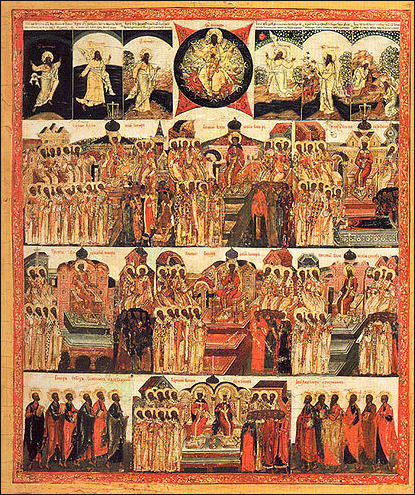
3. In the 5th century, 200 bishops met and refuted the heresy of Nestorius against the Mother of God.
The Nestorians believed that the Holy Virgin Mary should not be called “Theotokos”, but rather, only “Christotokos” – that is, birthgiver of Christ, but not of God. This teaching makes it unclear whether Jesus Christ, from the moment of conception, really was God!
From the beginning of the protestant faiths, they have been reluctant to give the honour of the name “Birthgiver of God” to the Most-Holy Virgin. Many protestants do not believe that the Virgin Mary remained a Virgin before, during, and after childbirth.
In contrast, the Orthodox faith teaches that the Most-Holy Virgin is holier than all the saints, because she fully contained within Herself and gave birth to – GOD the SON!
4. In the 5th century, 600 bishops refuted the monophysite heresy.
The monophysites believed Christ had only ONE nature – the DIVINE nature. They believed His human nature was absorbed in His Divine nature.
To this days, the Coptic “Orthodox”, Syrian “Orthodox”, and Armenian “Orthodox” have not renounced this belief.
The Orthodox believe that Christ had two natures, both Divine and human – otherwise, it would follow that the divine nature suffered on the Cross – something which is not possible for the unchangeable God.
5. In the 6th century, 160 bishops refuted the heresy of Origen.
This belief holds that ‘everyone is saved’ or ultimate universal salvation, regardless of faith and life. It is a very MODERN VIEW of faith, which we encounter every day in the modern society we live in.
The Orthodox faith is very different from this modern indifference – it requires a specific faith, and a specific practice, and sincere repentance wherever a person falls short of the ideal
6. In the 7th century, 170 bishops refuted the monothelite heresy.
The monothelites believed that Christ had ONLY one will - the Divine Will (NOT 2 wills as in Orthodoxy). The famous Saint MAXIMOS the Confessor suffered much, and finally had his tongue cut out because of his stance against this heresy. St Maximos was a simple monk, who taught the correct faith, acting against Emperors, Patriarchs, and Bishops who had accepted the non-Orthodox belief. As he was not even a priest, but only a simple monk, he is an example of what courage, firmness, and knowledge every lay person should have in keeping the Orthodox faith.
7. In the 8th century, 360 bishops met and refuted iconoclasm.
The iconoclasts believed we should not make icons of Christ, the Mother of God, or the saints. This heresy disturbed the Church from more than a hundred years. There were martyrs for the icons, icons were destroyed, and the whole Byzantine empire was implicated.
ALL these Heresies produced thousands of martyrs. Orthodox faithful were killed for refusing to accept these new distorted and altered forms of faith. To this day the TRUE Orthodox Church believes that these Church Councils, through the operation of the Holy Spirit condemned and judged these Heresies, and the ORTHODOX FAITH was defined and confirmed for all time.
YOU are not Orthodox unless you believe according to the Holy Ecumenical Councils. But this is not all – you must also make sure your Bishop believes according to the Seven Ecumenical Councils. This is because the BISHOP is the head of the local Church. How the Bishop BELIEVES is how the Church BELIEVES.
According to the LAWS (the Canons) of the 7 Ecumenical Councils:
1. An Orthodox Christian cannot leave his bishop….EXCEPT if the Bishop is in heresy.
2. An Orthodox MUST, or is obliged to leave his Bishop if he is in heresy.
On this basis people like us left ROCOR(MP) in 2007 when it joined the Moscow Patriarchate (MP), because this organisation fully participates in the World Council of Churches (WCC), and through it, in ECUMENISM – a teaching which has been defined by Church fathers as heresy of heresies.
All the ‘mainstream’ Orthodox bishops who participate in the WCC, and the Churches they represent, do not truly follow the decisions, Canons, ands Laws of the seven Ecumenical Councils. They have signed documents to be ONE with the very heretics condemned by these Councils!
For example, well-known bishops (even patriarchs!) publicly pray with not only Monophysites and Catholics, but also with pagans and Jews. Prayer together with people who believe entirely differently is not allowed for Orthodox people. Therefore, such hierarchs have put themselves outside the Orthodox Church - and no sincere Christian can follow them.
Roman Catholics recognise another 20 Councils as Ecumenical. One of their most recent councils teaches that the Pope of Rome, when he speaks ‘ex cathedra’ is sinless. As mentioned above, they also changed the Symbol of Faith from the 2nd Ecumenical Council.
Protestants and later Christian Sects descended from the Protestants do not acknowledge ANY Ecumenical Councils. This is interesting because the composition of books in Holy Scripture (which they regard as their sole source of authority) was finally decided only in the 6 Century, at the 6th Ecumenical Council (!)
Many of the Heresies of the first Centuries were widespread, lasted a long time, and caused tremendous disruption in Church and political life, with great loss of innocent life. ‘Everyone’ was a heretic. The vast majority of people were in the glorious big churches. The true Orthodox were suffering, persecuted and often tortured and killed, by people who a short while before attended the same church as them!!
The True Orthodox had to gather in Catacombs, and make-do churches anywhere they could.
There is nothing new about the majority being in heresy, and this majority persecuting the few faithful people.
In our times what is most dangerous for us is the entry of Orthodox Churches into the ecumenical movement. This means their acceptance of a Protestant ecumenical understanding of the Church. Such an understanding in reality is already spoken of at meetings and printed in the books of Orthodox ecumenists. Together with the breakdown of an authentic Orthodox understanding of the Church we find an undermining of the meaning of the Ecumenical Councils which means a consequent loss in the firmness of the Council’s dogmas. As a result, the very foundation of Orthodoxy is undermined. ( Protopresbyter Michael Pomazansky. From Orthodox Life, No.1, 1989.)
However, we must understand that the heretic, non-Orthodox Christians are not necessarily “bad people” – but they are not Orthodox. They are not in God’s Church.
We should pray for them and feel sorry for them – bring them to Orthodoxy, by our example faith and life. Those who have left the Orthodox Church, or who entertain non-Orthodox teachings while still outwardly appearing to be “orthodox” are the poorest of the poor – for they have lost their salvation through the Holy Orthodox Church!
Dear brothers and sisters…..we must RUN to the MOTHER OF GOD for help, as the Orthodox Christians always have done.
She will protect, guide and help us. She is our help and Protectress.
Incorrect belief and distortion of Orthodox faith (as defined by the seven Ecumenical Councils), is a spiritual sickness. People who have stopped running to the Mother of God for guidance and help …..eventually end up in incorrect belief, or even no belief or faith. Some even start persecuting the true faith.
Let us pray especially for the younger generations, our children, and their children who will need even more help to survive in our increasingly antichristian world. Amen.
Saturday, June 21, 2014
The true Church and false churches
Sermon of Bishop Averky (Taushev) on the True Church.
